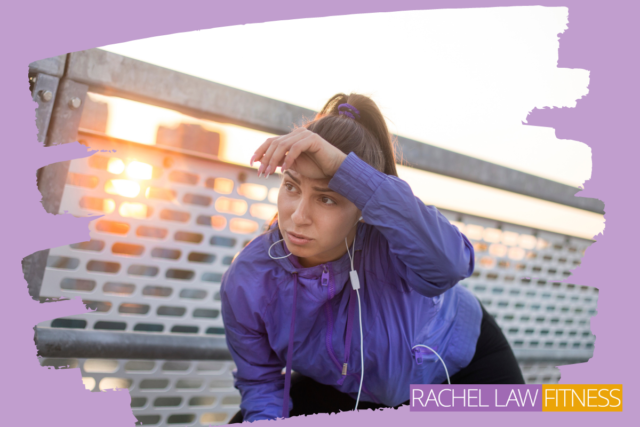Sleep affects every bodily function.
It is the key to having the energy we need to conquer the day.
While we sleep our brain gets rid of any unwanted substances, files and processes new information, helps produce our immune system, and helps produce the hormones our body needs.
How much sleep you need varies from person to person and is influenced by a variety of factors, including genetics and age. The more active you are and the more you’re learning, the more sleep you need.
Why Do You Workout?
We exercise for a variety of reasons:
- Cardiovascular health
- Increase lean muscle mass
- Improve endurance
- Maintain a healthy body composition
- Lose Weight
If you want to get the most out of your workouts, getting enough sleep is a big deal.
We MUST sleep for exercise to ensure we reach our goals!
-
Muscle Repair and Recovery
Sleep gives your body time to recover, and restores the immune and endocrine systems. The endocrine system is responsible for creating and spreading key performance hormones like testosterone and human growth hormone throughout your body. During childhood and adolescence growth hormone makes us grow. Once into adulthood, it helps repair tissues and muscles. We need good quality sleep to produce growth hormones.
Research shows that the dreamless non-REM sleep phase of sleep increases protein synthesis and the mobilisation of free fatty acids, providing energy to repair the muscles you broke down during your workout.Disrupted sleep will affect your workout recovery, as muscles can’t fully restock their energy stores in the form of muscle glycogen. Glycogen is one of the body’s main energy sources during exercise, and when you run out, you may end up hitting a wall. Muscle glycogen shortage is known to reduce muscle function and total work.
. -
Performance
Exercise performance can decline after just one night of restricted sleep.A study (European Journal of Applied Physiology 2009) on the effects of sleep deprivation on running endurance, found that participants covered nearly three percent less distance on no sleep than they did when well-rested.
Similarly, inadequate sleep can limit the maximal muscle strength you have to perform compound movements during resistance training (Journal of Science and Medicine in Sport, 2018)
However, one of the main reasons poor sleep leads to less-than-optimal exercise performance, may have less to do with actual physiological changes to the muscles and cardiovascular system and more to do with perceived effort. So exercise will feel harder when you are tired, making you fatigue sooner (Sports Medicine,1989)
. -
Motivation
As well as making your workout feel harder, poor sleep will affect your motivation to work out, making you less likely to complete the workout, and more likely to shorten it. Good sleep has been proven to help motivate people to stick to their exercise plans and complete their exercise regime (Journal of Clinical Sleep Medicine).
. -
Food Choices
Sleep plays a very important role in controlling our appetite hormones. It helps balance out levels of ghrelin, the hormone which controls hunger, and leptin, the satiety hormone, enabling us to manage our hunger better.
Poor sleep impacts the brain areas responsible for choosing food, leaving us more likely to eat more food and to eat worse food.When sleep-deprived, we tend to crave sweet and fatty foods, while the sensible bit of the brain that helps with willpower is less likely to stop us making those decisions. Hence long-term sleep deprivation is correlated to obesity.
Researchers at the University of Chicago found that going to bed 75 minutes earlier every night helped people consume 270 fewer calories each day.
. -
Body Composition
A lack of sleep boosts levels of the stress hormone, cortisol. Cortisol has an impact on your body composition, with high levels causing a build-up of abdominal fat. It has also been shown to break down muscle tissue.
.
How Can I Sleep Better?
There are many factors that can interfere with a good night’s sleep. While you might not be able to control all of these you can adopt habits that encourage better sleep. Start with these simple tips.
-
Stick to a sleep schedule
Most people need between six and nine hours of sleep a night. If you fall asleep in under half an hour, don’t wake during the night for more than half an hour, you’re not waking more than about half an hour before your alarm goes off and you feel refreshed when you wake up, you’re probably getting enough sleepGo to bed and get up at a similar time every day. Try to limit the difference in your sleep schedule on weeknights and weekends to no more than one hour. Consistency reinforces your body’s sleep-wake cycle.If you don’t fall asleep within about 20 minutes, leave your bedroom and do something relaxing. Read or listen to soothing music. Go back to bed when you’re tired. Repeat as needed.
. -
Consider what you eat and drink in the evening
Don’t go to bed hungry or over full. Watch nicotine, caffeine and alcohol. The stimulating effects of nicotine and caffeine take hours to wear off and can wreak havoc on quality sleep. And even though alcohol might make you feel sleepy, it can disrupt sleep later in the night.
. -
Create a restful environment to sleep in
This generally means a cool, dark and quiet bedroom. Exposure to light might make it more challenging to fall asleep. Avoid prolonged use of light-emitting screens just before bedtime. Calming activities before bedtime, such as taking a bath or using relaxation techniques, might promote better sleep.
. -
Limit daytime naps
Long daytime naps can interfere with night-time sleep. If you choose to nap, limit yourself to up to 30 minutes and avoid doing so late in the day.
. -
Include physical activity in your daily routine
Regular physical activity can promote better sleep but avoid being active too close to bedtime. Spending time outside every day might be helpful, too.
. -
Manage worries
Try to put aside worries or concerns before bedtime. Get organised, set priorities, and delegate tasks Jot down what’s on your mind, make a list, and then set it aside for tomorrow.

Rachel Law is a personal fitness trainer based in New Malden, Surrey. Qualifications: ActivIQ Level 3 Personal Training; Burrell Education Pregnancy Exercise Prescription; Burrell Education Advanced Pregnancy Wellness Practitioner; Burrell Education Advanced Post Natal Exercise Prescription; Burrell Education 3rd Age Women Optimal Health and Nutrition; Burrell Education Peri Natal Athlete; Burrell Education Pelvic Flow and Freedom; Olympic Weight Lifting; Premier Global Kettlebells; FIE Level Assessment and Mentoring


